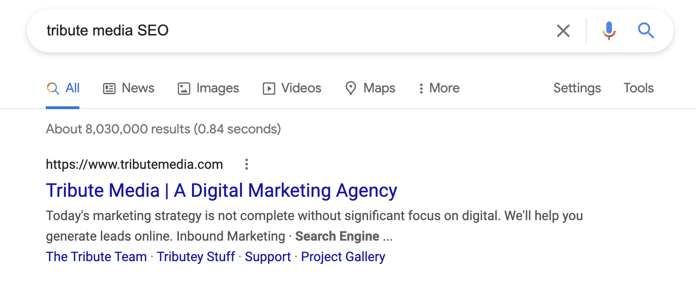Meta Description FAQs for 2023
Posted by Emery Pearson on Nov 14, 2022 2:42:00 PM
%20(1).jpeg?width=1240&name=meta%20description%20concept%20graphic%20(1)%20(1).jpeg)
What Are Meta Descriptions?
Those short blurbs you see on the SERP (Search Engine Results Page) below the page title is called a meta description. It's used to let searchers know what the page is about so they can decide whether to visit that page or not.

Sounds pretty simple, right? The truth is, meta descriptions can be a little complicated. Because there are so many questions around meta descriptions—how to write them, how to write them well, how they impact SEO, to just name a few—this guide will take a deep dive into some of the answers to frequently asked questions. We'll cover the how and why of meta descriptions, discuss how Google and other search engines view them, and talk about why they don't always appear on the SERPs as you've written them. Let's get started.
Do Meta Descriptions Affect SEO?
The short answer is no, they don't technically impact SEO. However, they are an important part of your SEO strategy as they are one of the first things searchers see when they encounter one of your pages. Meta descriptions affect organic click-through rate (CTR), which is an important metric.
Do Meta Descriptions Impact Ranking?
Again, the short answer is no, they do not have a direct impact on keyword rankings. As we mentioned above, meta description optimization should be part of a holistic approach to SEO. That includes considering things like click-through rates and user experience—both of which are related to meta descriptions. Click-through rates affect your inbound clientele.
The more descriptive and relevant you can be, the better. Here are some examples of bad meta descriptions.
META DESCRIPTIONS TO AVOID...
AREN'T HELPFUL OR ATTRACTIVE
If someone searches for "Best Mexican Food in Boise," they'd be much more likely to click on a meta description that said:
"Fried up in traditional Mexican spices that challenge any food connoisseur's taste buds, our dishes will satisfy..." rather than click on "Mexican food has come a long way since..."
THEY REPEAT THE TITLE
Not much to say here except that it's pretty obvious that you shouldn't do it.
Why Are Meta Descriptions Important?
If they don't directly affect SEO or rankings, why do they matter? Meta descriptions matter because they help potential customers understand what your site or page is about. On any given SERP, there are several options shown to searchers, so meta descriptions allow them to get a bit more context before clicking on one. A good meta description will describe the page's contents and entice searchers to click—that means traffic and possible customers for you.
Should Every Page Have a Unique Meta Description?
Yes, because every page has unique content. Additionally, Google says, "Identical or similar descriptions on every page of a site aren't helpful when individual pages appear in the web results." Google will often auto-generate its own snippet for a page (more on that later), but it's still good practice to ensure that each page has a unique, compelling description.
What Happens if You Don't Have a Meta Description?
Google will have a harder time understanding your page if you don't have a meta description, which is one reason why it's good practice to include one. Additionally, if the page has no meta description, Google will choose a chunk of the text on the page to show on the SERPs.
Can the Meta Description Be the Same as the Content?
Generally, it's best to write meta descriptions separate from the content on the page, as the description should give an overview of the page's content and entice users to click. It's not totally necessary, though, and sometimes a snippet of the on-page text works fine for a description.
What is the Character Limit for a Meta Description?
About 160 characters (or 920 pixels) is the maximum amount that will show up on the SERPs, but sometimes it's even shorter (as you can see from our example at the top of the page). A good rule of thumb is to shoot for between 120-158 characters for best results. You can use a tool like this SERP simulator to help you review your website's SERP snippet.
Why is Google Rewriting Meta Descriptions?
Oftentimes, the meta description you write isn't what shows up on the SERPs. There can be a number of reasons for this. Your description might not do a good job of accurately describing the content, so Google pulls from the on-page content instead. Or, your actual description might show up for certain queries, but not others—this is because Google tries to match searcher intent, and a different snippet might better align with the perceived intent. The description will often be a few sentences on the page, or a few sentences or words from different parts of the page.
In the example below, the search "Tribute Media SEO" shows a different meta description than what we've created (see the actual one at the top of the page). This is Google trying to match content with what it thinks I'm looking for.

If Google Isn't Showing my Meta Description, Doesn't That Mean They Don't Matter?
You should still create meta descriptions anyway! If your description isn't showing up at all, for any query, take that as a sign that what you have isn't working. But remember, Google wants to help connect searchers with the content they need, so even if you have a great description, Google might change it for specific searches—and that's a good thing.
What Makes a Good Meta Description?
Typically, you'll need to test different ways of writing meta descriptions to find out what works for your site's pages. Here are some best practices to keep in mind as you do:
- Keep it the right length. As we mentioned above, 120-158 characters is a good ball park. Anything longer and it could be truncated on the SERPs; anything shorter might not be descriptive enough.
- Make it unique and relevant. Again, each page should have its own description, and it should accurately describe the content users will find on the page.
- Use active voice and calls to action. Dynamic descriptions elicit a better response from the user, and it helps them understand the value of the content.
- Use keywords (when it works). Don't keyword stuff, but do include the target keywords relevant to the page. Keep in mind that Google bolds the words in the description that match the user's query, which can be better for click-through rate (CTR).
- Be sure it reflects the page. Google isn't going to mess around with any meta description that misleads searchers, so if you're promising something that the page doesn't offer, Google isn't going to show the meta description (or possibly the page).
Conclusion
Meta descriptions still matter in 2022, even though they don't directly impact SEO, and even though Google doesn't always use them. Be sure that meta description optimization is part of your long-term strategy: revisit them regularly, test out different languages and styles, and tailor them to users.

Written by Emery Pearson
Emery is the content strategist at Tribute Media. She has an MA in rhetoric and composition from Boise State University, and she is currently an MFA candidate in creative writing at Antioch University. She lives in southern California with a bunch of creatures and many plants.


